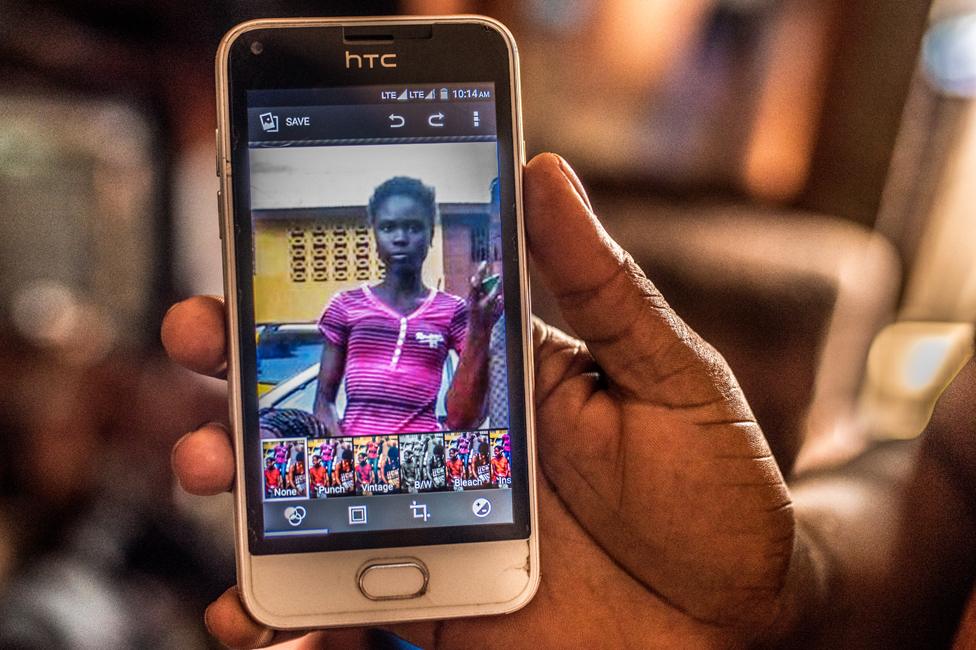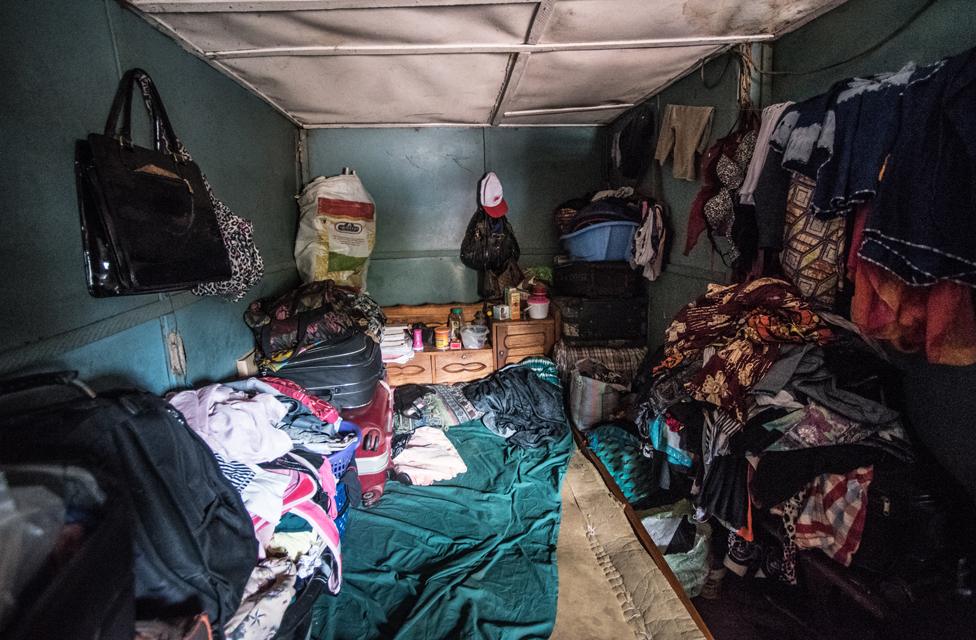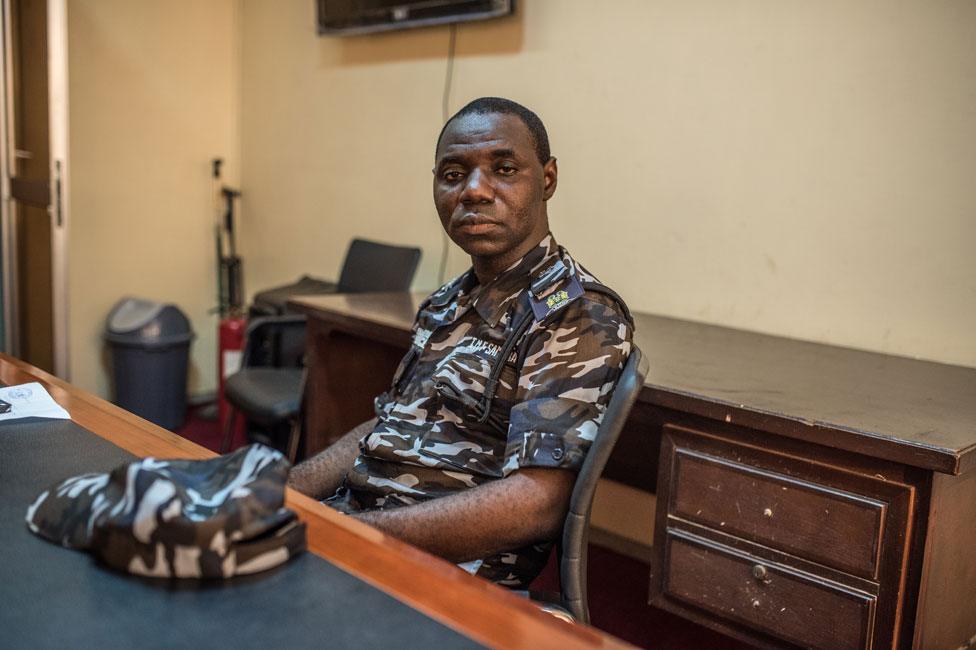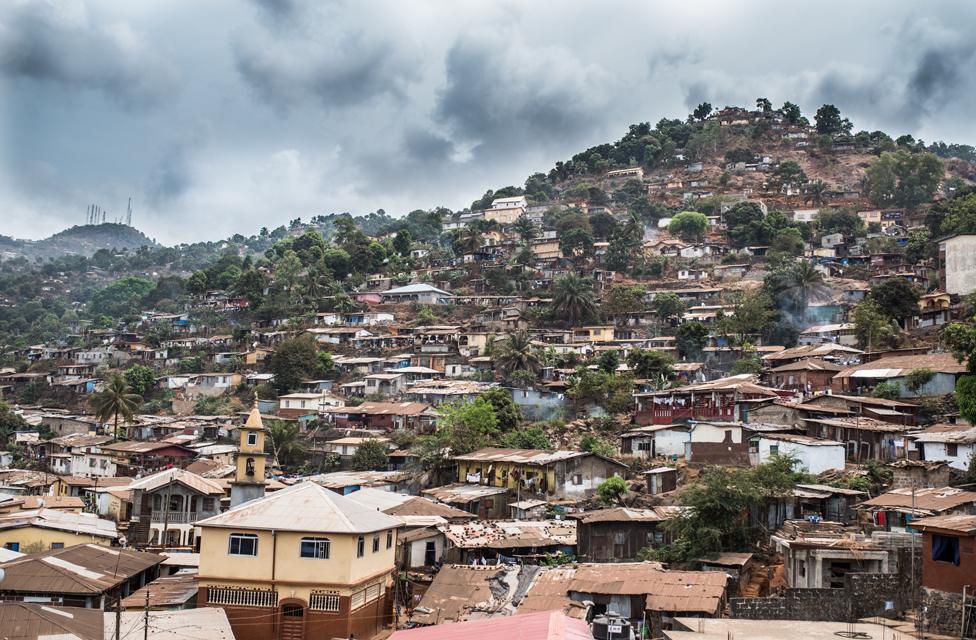The country where children fear election time
- Published

When elections come round in Sierra Leone parents are warned to take extra care of their children, as it's feared that candidates or their supporters may abduct them and use their organs in black magic rituals. Olivia Acland reports on troubling signs that the rumours may be true.
WARNING: Readers may find this story disturbing
At 10:00 on Friday 16 February, less than a month before Sierra Leone's presidential, parliamentary and local elections, 14-year-old Mabinty Kamara clambered down the rocky path outside her house in Freetown. She was wearing a knee-length black skirt and grey polo shirt, and was swinging two plastic jerry cans.
The water pump was about 800m away - just a few minutes' scramble down and up the stony mud lane carved into the hillside. With her mother away visiting relatives, Mabinty had been told to fetch water by her 25-year-old sister, Alimatu, who was at home finishing up the other morning chores. As Muslims, this was the first day of their weekend.
Alimatu swept the floor of their scruffy, tin-roofed house and shook out the bed sheets. She cooked some rice for her younger brother, sister, and cousin, and washed up the pans. After a couple of hours, though, she started to wonder why Mabinty had not returned. She scrambled down the path, shouting her sister's name, expecting to find her sitting with friends and gossiping.
At the water pump a gaggle of women said that they hadn't seen Mabinty, so she started knocking on neighbours' doors and questioning people on the streets. After hours of fruitless searching she went home and waited, thinking that perhaps her sister had returned to the house when she was out, and since left again. Anxious hours passed and finally at 18:30 Alimatu went to the police station to report her sister missing.
"A policeman told me to go home and that he'd call me if they found her," she says, twisting one of her short dreadlocks. "I couldn't sleep at all that night, it's not like her to stay out. I was very worried."

The room where Mabinty lived with Alimatu, another sister and a younger brother
Alimatu spent the next four days wandering all over Freetown, checking areas where runaway children are known to sleep rough. She showed a zoomed-in picture of Mabinty, which she had downloaded to her phone from Facebook, to more than 100 strangers.
Five days later she had reached Waterloo, a traffic-clogged industrial suburb an hour's drive from her house, when she received a call from one of her neighbours. He shouted down the phone that Mabinty had been found: her dead body was wedged between some buildings at the back of the Ministry of Education. She was identifiable by her black skirt, grey top, and the two empty jerry cans lying beside her. Her right leg had been cut off at the knee.
But she was missing more than just a leg, says Dr Owiss Koroma, Sierra Leone's only pathologist. On examining her body he found that her tongue, ovaries, intestines, womb, fallopian tube and vagina had also been taken. Someone had removed them with surgical precision. The case, says Koroma, has all the hallmarks of a ritual killing.
These murders, carried out so that body parts can be used in black magic rituals, usually involve child victims, whose younger and healthier organs are thought to be more powerful than those of an adult.
"People use body parts for fame, wealth, or to gain power," says Ibrahim Samura, head of media for Sierra Leone's police force. The parts can be used in different ways, depending on the purpose. Tongues are thought to empower a person to speak well, for example. A juju man will say, "I need a female breast," Samura says. "It will be used as a charm or a sacrifice."

Ibrahim Samura: Parents should not allow unaccompanied children to the beach or to parties
It's thought that the juju man's clients could be local or national politicians, or anyone with a strong interest in the outcome of the vote - and that the body parts may sometimes be eaten.
Koroma says cases of ritual killing occur in Sierra Leone every so often, even when elections are not approaching, but he is aware of three cases in the last six months - significantly more than usual.
The first of the victims was a 10-year-old girl in Western Freetown, whose remains were found in a large, checked bag made from thick plastic. She was missing her left ear, left leg, left arm and part of her vagina. After this case, he examined Mabinty Kamara's mutilated body, and most recently - on 15 March, after the first day of voting but before this weekend's elections - the dismembered body of a four-year-old, found in a forest in Port Loko, in the north-west of the country. The child had been decapitated, and every organ had been removed, except for the liver. There were two holes in the back of the cranium. Koroma says he is alarmed by the precision of the surgery, as it suggests that someone with significant medical experience was involved.
Police also say there has been a spike in reports of missing children - though they are unable to provide statistics - and have responded with a nationwide publicity campaign.
"We use community radio stations right across the country to alert parents and community leaders about the trend of crime relating to missing children," says Ibrahim Samura. We tell them that they shouldn't allow their children under 18 to go to the beach or to parties unaccompanied."
The message seems to have got through.
A shy schoolgirl told me last week that she is now scared to walk the 4km from school to her house in the village. Anxious parents have said that they are warning their offspring to be particularly cautious - not to accept sweets or lifts from friendly-looking strangers.

But rumours can swirl out of control. When two children were found dead in the back of a car in January, an online newspaper reported that "cannibalistic rituals, by "devilish politicians" had long been a problem at election times. Pathologist Owiss Koroma examined the bodies, though, and says the children died from carbon monoxide poisoning; there was no evidence of ritual killing.
Those most at risk of abduction are children sleeping out on the streets. Jorge Crisfulli, country director for the Don Bosco Fambul child-welfare organisation, says that between 20 and 25 children have approached his staff seeking shelter in Freetown in recent weeks and that others have returned to their villages.
Twelve-year-old Abdul says he narrowly escaped a ritual killing after climbing on to a neighbour's roof to retrieve a lost football. The occupants of the house seized him and started beating his head against a step, accusing him of trying to steal from them. He was then held for days in a room, where he was tortured and drugged, he says, until he overheard a chilling conversation between two of the men.
"One of the brothers said let him kill me, cut the parts that you want, and put the rest into black plastic bags to throw in the gutter," Abdul says.
That evening he escaped and went to the police, who called Don Bosco asking them to take him into their care.
Adia Benton, a cultural anthropologist at Northwestern University in Chicago who has studied Sierra Leone for years, says ritual killing, or at least rumours of ritual killing, "escalate around elections, or times of power struggle". She remembers hearing similar stories during elections in the country in 2007. The alleged victims were always children.
The country's most notorious court case, however, involved an adult and was not election-related.
In 2015 a DJ, known as DJ Clef, was invited to play a set at a party in the house of famous herbalist Baimba Moy Foray. Clef, whose real name is Sydney Buckle, was later found dead, missing his genitals, toes, fingers and nose. It's rare for anyone to be arrested and prosecuted in ritual killing cases, but Baimba Moy Foray and an accomplice were convicted and sentenced to death by hanging - though this was later changed to life imprisonment.
Nobody has yet been prosecuted in connection to Mabinty's case. Thirteen suspects were rounded up and then released on bail. Alimatu is one of them.
"Every day I must report to the police station to sign in," she says.
She would normally spend her days selling oil and rice to make money to support her younger siblings, but lately she's just been sitting listlessly on the steps of her house.
"I don't feel like selling now, I don't feel good," she says.
"It makes me so sad. Only God knows what happened to my sister."
The police officer who was initially in charge of the case, A S P Mansaray, says three of the suspects were guards from the Ministry of Education and another nine were a random selection of Mabinty's neighbours who were around at the time of the crime.
He hoped that even if they were not the killers they might be able to provide useful information. However, so far no leads or evidence have emerged. It looks set to be another unsolved crime.
Photographs by Olivia Acland
Join the conversation - find us on Facebook, external, Instagram, external, YouTube, external and Twitter, external.
